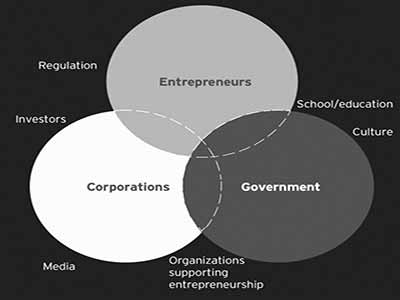 The financial services sector, with “myriads” of challenges, still came out tops as one of the five potential sectors that would initiate growth indices and eventually, bailout the economy. Currently reeling under the challenges of debt and impairment provisioning and foreign exchange illiquidity, which were induced by falling international price of crude oil, the sector has also reduced non-interest earnings capacity to contend with.
The financial services sector, with “myriads” of challenges, still came out tops as one of the five potential sectors that would initiate growth indices and eventually, bailout the economy. Currently reeling under the challenges of debt and impairment provisioning and foreign exchange illiquidity, which were induced by falling international price of crude oil, the sector has also reduced non-interest earnings capacity to contend with.
Still, experts said it holds massive opportunities for the country, especially now that the headwinds are high. How?
EY report says: “No one can go it alone when it comes to high-impact entrepreneurship. The “Power of Three” is critical for effecting positive change. With all elements of the ecosystem closely interlinked, fostering an effective entrepreneurial ecosystem is clearly a joint effort between government, entrepreneurs and enterprise. Working together, these three actors can support a thriving entrepreneurial ecosystem, providing different strengths and capabilities to drive results.”
The Partner and Emerging Markets and Global Deputy Leader, EY, Rohan Malik, said the number of the unbanked people in Nigeria is stile high. Perhaps, he is calling for the interlinking of the ecosystem- legal framework (government), entrepreneur (the creative ideas embodied in individual person) and enterprise (the organization that would serve as the special purpose vehicle), to bring about needed development from the identified gap.
Access to funding, entrepreneurship culture, tax and regulation, education and training, and coordinated support, are interlinked in the entrepreneurial ecosystem.
Stressing the need to encourage entrepreneurship in the country, he said government bureaucracies, lack of clear communications, regulations and non-implementation of policies remain challenges that entrepreneurs face.
“Access to funding remains an issue, not because there is no funding, but because there are not enough bankable projects. Many entrepreneurs don’t know what it will take to fund a business. They underestimate very often the actual amount of investment required.
“The second is access to markets. Many entrepreneurs don’t understand how they can access the markets beyond the local context. How they can be national and international. For me, that is a common challenge why an entrepreneur or a small business remains local.
“It is a huge challenge for government to think that their job is done when they produce policies. That is the first step on the journey. How to go from policy to outcomes is the challenge, and entrepreneurs suffer from that,” he added.
Beside the financial services sector, he also listed telecommunications, manufacturing, real estate and agriculture. No doubt, this list may serve as a reaffirmation of what the country already knew.
“The sector where I believe there is an advantage which Nigeria has got, is the financial services, but it comes down to how you formalise and shape these. Thinking about banking the unbanked, people who don’t have bank accounts today are huge. It is a huge opportunity to get them on.
“If you look at the opportunities in telecommunications, which technology is giving today to governments around the world and for citizens, there is a huge amount of opportunities right now for Nigeria.
“If you think about the number of people in Nigeria who are involved in agriculture- over 50 per cent, how can you ignore the biggest sector of all? And agriculture can lead to things like food processing.
“So financial services, telecommunications, manufacturing, real estate and agriculture will give the country great dividends,” Malik said.
Noting that these opportunities are interlined with the financial services sector, he described the decline in oil prices as an opportunity for economies that depend on oil as a revenue earner to “reinvent” the wheels.
“So, I feel this is a golden opportunity for the government to actually shape policies that will deliver impact to the vast majority of the population in Nigeria.
“I think the international community is looking at Nigeria with great expectations from the new regime. International investors see Nigeria as a beacon of hope because of the vast demographic dividend it has got, together with the young population. I feel the government should take this opportunity with the low oil price to ask ‘what could this low oil price actually give to us?’”
He noted that distance has never been a problem for investors, but where opportunities meet with right mix of risks and returns.
“Today Nigeria has to compete for investments with the likes of India, China, the Middle East, South America, the so-called higher growth markets.
“The global investors are still looking at deals. I was talking to some of the investors recently and they said, ‘We have got more money than bankable projects today.’ In other words, money is not the problem. So I think Nigeria is to compete in a much harsher climate today with other economies and they are looking at Nigeria vis-a-vis India, China and others,” Malik said.



